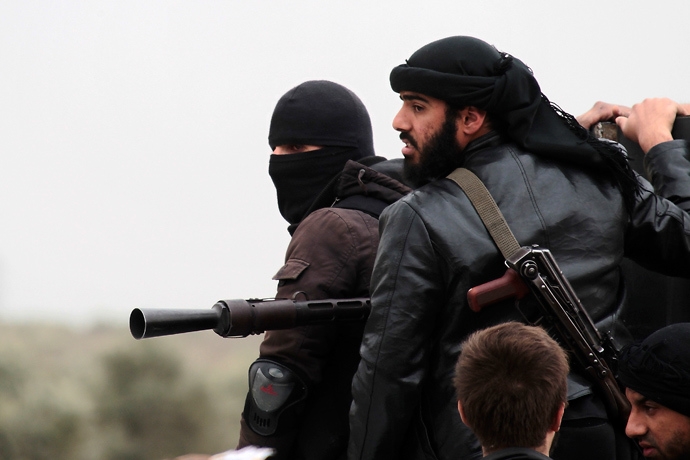Nusra threatens attacks in West over coalition's Syrian strikes

Al-Nusra Front, the al-Qaeda affiliate battling in Syria, issued its loudest battle cry yet against both Islamic State and the US-led coalition seeking to root them out.
In an audio recording circulated on YouTube on Sunday, entitled “For the faithful, sacrifice is easy”, Nusra Front leader Abu Mohammed al-Jolani threatened that militants would carry out revenge attacks for coalition attacks, dubbing the US-led strikes targetting Syria as a “war against Islam.”
“However hard the West tries to fight us from afar… the battle will move to the hearts of your homes.”
'Crusader campaign'
Jolani decried the “crusader campaign”, using the nickname coined by vociferous opponents of the coalition strikes, which began on Iraq on 8 August and were extended to Syria on 23 September.
Addressing the citizens of Western coalition partners directly, Jolani said that “the price of war will not be paid by your leaders alone. You will pay the biggest price. You must take a stand against decisions taken by your rulers.”
In the 25-minute long video, Jolani also warned Syrian rebels from across the spectrum against joining the US-led coalition against IS.
The statement comes a few days after another leading faction in Syria’s ongoing war, the Islamic Front, denounced the coalition strikes.
In a statement signed on 25 September, the Islamic Front accused Western powers of allowing “Assad’s crimes” to go on in silence for four years, and of preventing Syrians from accessing the weapons that would have allowed them to protect themselves from the “airplanes of death.”
In a brief statement, the group announced its rejection of any “group or coalition that increases our suffering through killing, intimidation and displacement” on the grounds of a “war on terror.”
It also issued a “warning” to anyone launching attacks against either civilians or “revolutionaries who went out to fight the criminal regime” of President Bashar al-Assad, whom they alleged to have played a fundamental role in helping IS to grow.
Fears of unity between IS and Syrian rebels
These statements from Nusra Front and Islamic Front have led to growing fears of a rapprochement between IS and other rebels across the spectrum in the wake of US-led airstrikes in Syria.
73 Nusra Front members defected to IS last Friday, according to a Nusra Front member who spoke to the UK daily The Guardian.
However, Jolani also used his latest recording to urge Nusra Front supporters to continue their fight against IS militants, accusing the rival group of giving the US “a pretext to attack jihad [fighters] in the Levant, after their losses in Afghanistan and Iraq.”
Analysts are sceptical about the possibility of a reconciliation between long-time enemies Nusra Front and IS.
Charles Lister, a fellow at the Brookings Institute, called the fears of a united front against the anti-IS coalition “dramatically premature”, warning that they ignore a long history of hostility between the two groups.
Aron Lund, editor of Syria in Crisis and author of several books on the Syrian opposition movement, explained that the groups have a long history of enmity, exacerbated by IS’s declaration of a “caliphate” on 29 June.
“There is very little to compromise on between Nusra Front and IS, after Baghdadi has come out and said he is the ruler of all the world’s Muslims. There’s not much middle ground.
“There is always scope for people within both IS and Nusra Front to switch sides and go back and forth between the two. That has happened ever since they split, even at middle leadership level.
“However, I don’t think the groups as such will join forces.”
Recruitment drive
Though he does not think the statement signals a clear change in policy towards IS, Lund suggests that the decision to oppose the coalition bombing and directly threaten Western interests could be a political move.
“Nusra Front has never threatened the West or others openly before, even though it’s known that they are an al-Qaeda group. They have kept it out of their rhetoric to seem focused on Syria.”
Now, he says, “there will be some volunteer recruits who are in this because they want to fight the West, especially foreign fighters.
“If IS is seen as the primary opponent of the US, that will help them to attract such fighters and also perhaps some funders.
“But now that Nusra has been struck as well, perhaps this does not apply any more.”
Stay informed with MEE's newsletters
Sign up to get the latest alerts, insights and analysis, starting with Turkey Unpacked
Middle East Eye delivers independent and unrivalled coverage and analysis of the Middle East, North Africa and beyond. To learn more about republishing this content and the associated fees, please fill out this form. More about MEE can be found here.




